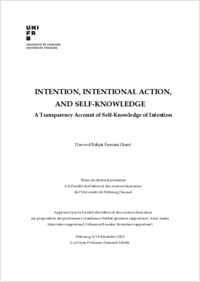Intention, intentional action, and self-knowledge : a transparency account of self-knowledge of intention
BHAP-PH
- Bahjat Fumani, Davood
- Soldati, Gianfranco (Degree supervisor)
- Fribourg (Switzerland), [2023]
1 ressource en ligne (171 pages) ; 1 fichier pdf
Thèse: Université de Fribourg (Suisse), 2023
English
This dissertation aims to elucidate the privileged access one has to one’s own
intentions by introducing a novel Transparency account of self-knowledge of
intention. The study demonstrates that there is not only a close connection between
knowledge of intentional action and self-knowledge but also that, in the case of
intention, self-knowledge can be derived from knowledge of intentional action. To
achieve this, the study presents a new theory of action called the Phronetic Theory of
Action (PTA), which highlights the importance of knowing how to perform an action
and exercising that knowledge in identifying intentional actions. According to this
theory, an agent performs an action intentionally if they possess the knowledge of
how to execute the action and exercise that knowledge. Based on this account,
knowledge of intentional action, as non-observational knowledge, is explained. Next,
this thesis delves into various accounts of transparency to demonstrate that PTA has
the potential to provide a transparency account for self-knowledge of intention. The
proposed Transparency account posits that knowledge of intention is transparent to
knowledge of intentional action. In line with Setiya, this account contends that
individuals with specific rational capacities can achieve self-knowledge by adhering
to a rule of transparency. For self-knowledge of intention, this account proposes that
knowledge-how is the specific rational capacity that one must utilise and suggests the
Phronetic Rule of Transparency: If one has the capacity to know how to φ, and based
on this capacity knows that one is φ-ing, one can, simultaneously and through the
same capacity, ascribe the intention to φ to oneself. In conclusion, the study offers two
suggestions. First, Anscombe's "why?" question could be replaced with the "what?"
question that seeks the knowledge-how exercised by the agent. Second, drawing on
Agentialist and Expressivist accounts of self-knowledge, it may be possible to extend
the Phronetic Rule of Transparency for Intention to other mental states. By doing so,
this dissertation provides a comprehensive framework for understanding the
privileged access one has to one’s own intentions and further explores the implications
of this framework for self-knowledge in general.
intentions by introducing a novel Transparency account of self-knowledge of
intention. The study demonstrates that there is not only a close connection between
knowledge of intentional action and self-knowledge but also that, in the case of
intention, self-knowledge can be derived from knowledge of intentional action. To
achieve this, the study presents a new theory of action called the Phronetic Theory of
Action (PTA), which highlights the importance of knowing how to perform an action
and exercising that knowledge in identifying intentional actions. According to this
theory, an agent performs an action intentionally if they possess the knowledge of
how to execute the action and exercise that knowledge. Based on this account,
knowledge of intentional action, as non-observational knowledge, is explained. Next,
this thesis delves into various accounts of transparency to demonstrate that PTA has
the potential to provide a transparency account for self-knowledge of intention. The
proposed Transparency account posits that knowledge of intention is transparent to
knowledge of intentional action. In line with Setiya, this account contends that
individuals with specific rational capacities can achieve self-knowledge by adhering
to a rule of transparency. For self-knowledge of intention, this account proposes that
knowledge-how is the specific rational capacity that one must utilise and suggests the
Phronetic Rule of Transparency: If one has the capacity to know how to φ, and based
on this capacity knows that one is φ-ing, one can, simultaneously and through the
same capacity, ascribe the intention to φ to oneself. In conclusion, the study offers two
suggestions. First, Anscombe's "why?" question could be replaced with the "what?"
question that seeks the knowledge-how exercised by the agent. Second, drawing on
Agentialist and Expressivist accounts of self-knowledge, it may be possible to extend
the Phronetic Rule of Transparency for Intention to other mental states. By doing so,
this dissertation provides a comprehensive framework for understanding the
privileged access one has to one’s own intentions and further explores the implications
of this framework for self-knowledge in general.
- Faculty
- Faculté des lettres et des sciences humaines
- Language
-
- English
- Classification
- Philosophy, psychology
- Notes
-
- Bibliographie
- License
-
License undefined
- Open access status
- gold
- Identifiers
-
- SWISSCOVERY 991171900618205501
- URN urn:nbn:ch:rero-002-122157
- Persistent URL
- https://folia.unifr.ch/unifr/documents/328777
Statistics
Document views: 354
File downloads:
- BahjatFD: 440
